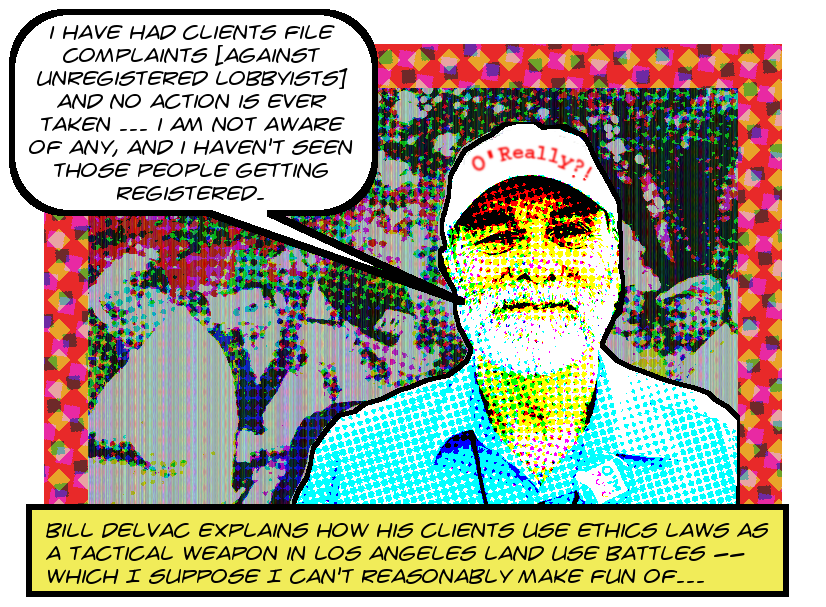 Oh dear, CPRA material from various BIDs, fascinating stuff, is pouring in as usual and just piling up on my metaphorical desk while I write post after post after post about the Ethics Commission‘s ongoing effort to revise the Municipal Lobbying Ordinance. Well, it can’t be helped, because the MLO is essential. Part of the process is holding a bunch of meetings to seek input, the first of which took place last Thursday. I’ve also posted my take on the various proposals. I’ll get to the BID stuff as soon as possible, friends, but meanwhile, here’s yet another MLO post.
Oh dear, CPRA material from various BIDs, fascinating stuff, is pouring in as usual and just piling up on my metaphorical desk while I write post after post after post about the Ethics Commission‘s ongoing effort to revise the Municipal Lobbying Ordinance. Well, it can’t be helped, because the MLO is essential. Part of the process is holding a bunch of meetings to seek input, the first of which took place last Thursday. I’ve also posted my take on the various proposals. I’ll get to the BID stuff as soon as possible, friends, but meanwhile, here’s yet another MLO post.
If you’ve been following the conversation you’ll know that the lobbyists opposing the proposed revisions have argued consistently that the City doesn’t need more regulations imposed on lobbyists who, according to them anyway, desperately want to follow the law but instead needs to register the herds of unregistered and unregulated lobbyists swarming around City Hall.
They’re not wrong that there are far, far too many unregistered lobbyists. Turning these people in to the Ethics Commission is one of the main purposes of this blog and I have, uncharacteristically, to agree with the registered lobbyists that there are an awful lot of unregistered lobbyists haunting 200 N. Spring Street and that the ease with which they can be detected is astonishing.
Where they are wrong is in their claim that there’s some kind of dichotomy between registering the unregistered and revising the laws. Mostly the people pushing this idea, that somehow revising the law and registering the unregistered are mutually exclusive, seem to be doing it only to distract everyone’s attention from how badly the present law needs revision and, possibly, how badly their subterranean activities might be exposed were the law to be revised.
At least that’s how it sounded in last week’s meeting when John Howland, late of the CCALA but more recently employed by Arnie Berghoff and Associates, broke out with the same old routine, of which I’ll spare you a transcription, because it’s essentially content-free. However, at that same meeting supervillainesque land use attorney Bill Delvac also had quite a lot to say, most of which, in contrast to the self-serving contributions of his fellow flacks in the so-called regulated community, was quite interesting.
On the subject of unregistered lobbyists, for instance, Bill Delvac asserted that not only were there bunches of them, but that many of the lawyers who professionally oppose development projects are engaged in lobbying, and that essentially none of them are registered. He also, surprisingly to me, revealed that many of his clients had reported such lawyers to the Ethics Commission but that no action had been taken. Heather Holt, executive director of the Commission, corrected him, saying “perhaps no public action.”
And turn the page for some comments on the more technical parts of what Bill Delvac had to say, including the only colorable argument I’ve ever heard against a compensation-based definition as the main criterion for registration as a lobbyist. There is also, as usual, a transcription of all relevant remarks.
Continue reading More Scenes From The First Interested Persons’ Meeting — Über-Lobbyist Bill Delvac Reveals That His Clients Tactically Report Their Opponents In The Land Use Wars To The Ethics Commission As Unregistered Lobbyists But No Action Is Ever Taken — Heather Holt Corrects Him With Provocative Obliquity: “Perhaps No Public Action,” Quoth She →



